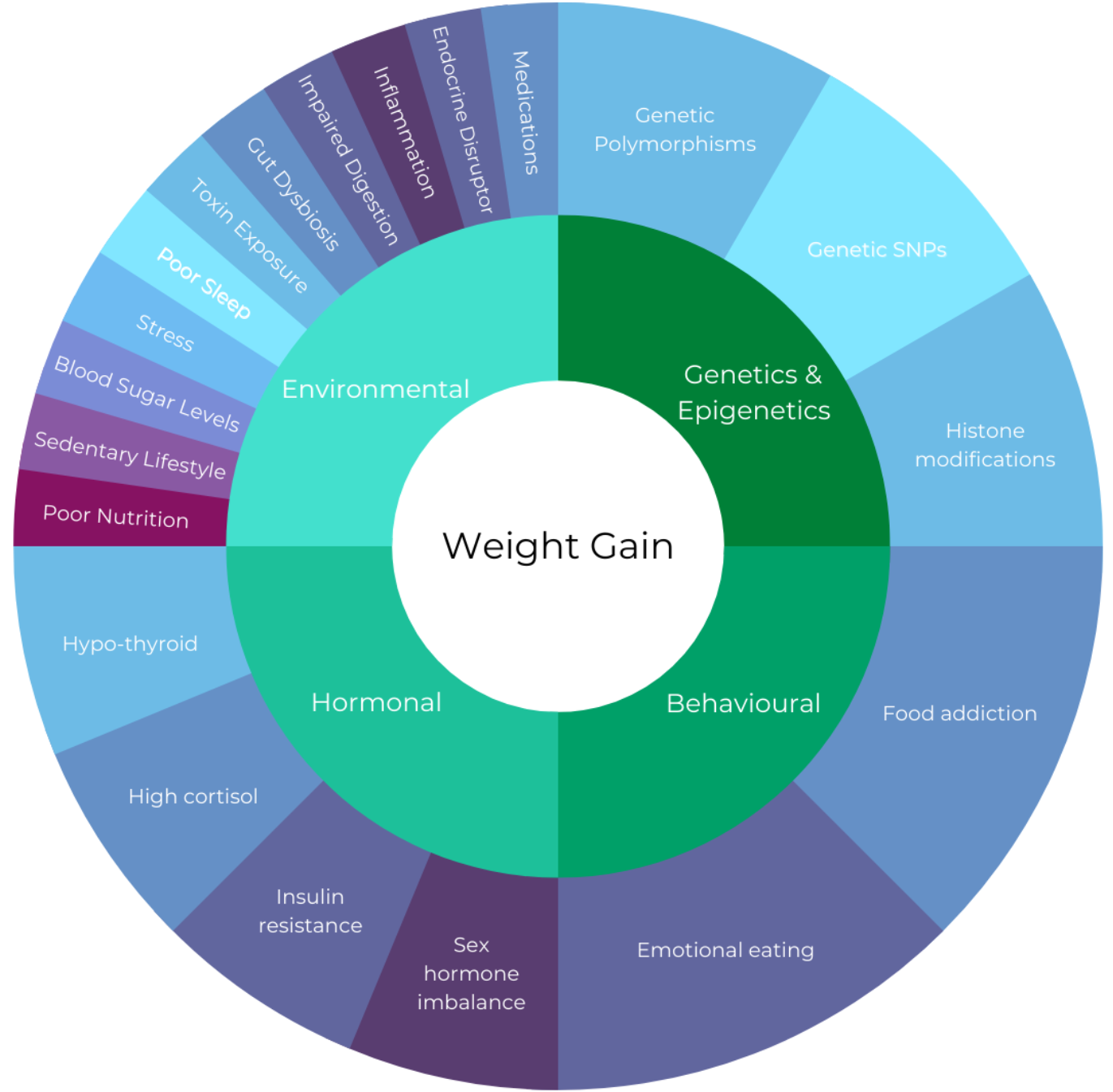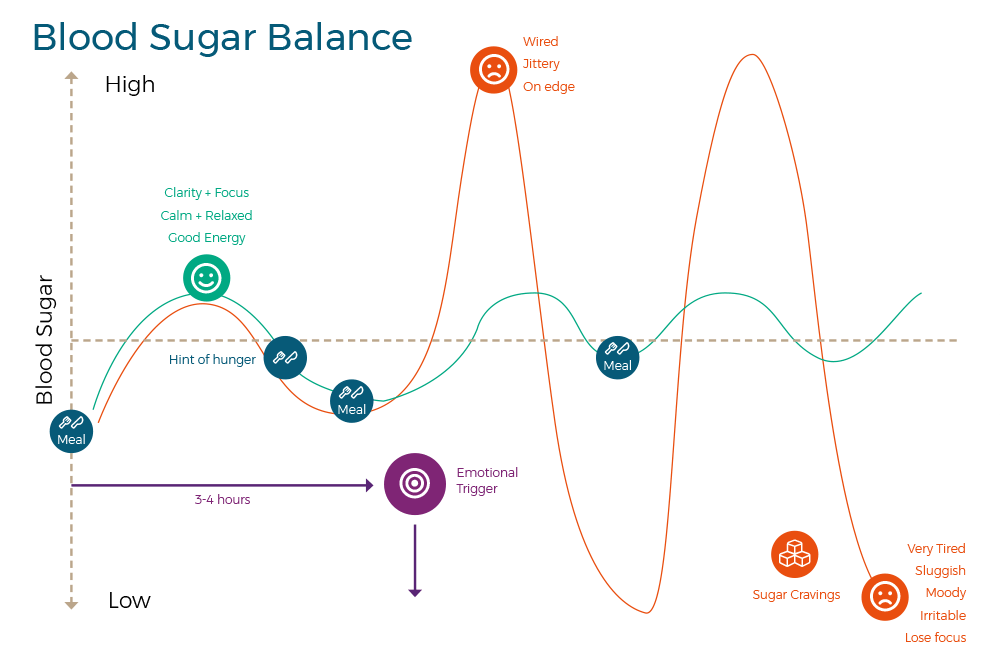Weight Loss
DISCOVER MORE ABOUT BALANCING HORMONES
Supporting You In Weight Loss
Weight loss is not just about calories in and calories out. If this were true, the phenomenon of dieting would actually work. When you reduce the calories you consume, your calorie expenditure also drops; if you drop from 2000 calories to 1500, your body immediately reduces your energy expenditure and you may end up feeling tired, cold, hungry and sluggish.
Other than our genetics, fat gain can be a result of interactions between our environment, behavioural patterns and hormones. The environment around us has a huge role to play in promoting weight gain. It can interfere with our hormonal and metabolic signals and amplify fat storage instead of fat burning.
It is therefore crucial to address the complex biological systems in the body that work closely together to keep our metabolism in check. Our team of weight loss specialists work progressively through your body systems to see which is challenged and may be obstructing your weight loss. They will consider all the potential factors driving excessive hunger or interfering with your bodys’ hunger signals.
The diagram below presents some of the variables that can lead to weight gain.

BALANCING BLOOD SUGAR
When you eat starchy or sugary foods they are broken down in the body into glucose which is carried around in the bloodstream to be utilised in the cells for energy.
The level of glucose in the blood is carefully controlled by a hormone called insulin. When blood glucose rises after a carbohydrate-rich meal, insulin is released to bring blood glucose levels back down to ‘normal’ levels. However, if your blood glucose rises too rapidly, the body can end up releasing too much insulin. This causes the blood glucose to swing to low again, making us feel tired, grumpy and once again, hungry. We call this blood sugar imbalance, as the effects of high and low sugar rollercoasters throughout the day.
If your blood sugar is constantly imbalanced, the body starts to ignore the insulin message, a condition called insulin resistance. This leads to permanently high blood sugar levels which can cause weight gain and can eventually lead to Type 2 Diabetes.

Balancing Hormones
If you are unable to lose weight it could be because of male or female hormone imbalances or the effects of chronic stress. Below are some examples of key hormones that impact our ability to lose weight:
- Oestrogen levels that are too high or too low can both contribute to weight gain. High levels of oestrogen in the body can play a role in insulin resistance, rising blood sugar levels and weight gain. Low levels of oestrogen can also cause a very stubborn type of weight gain. That often happens during the menopausal period. The ovarian cells no longer produce oestrogen, so the body starts looking for oestrogen elsewhere. One source is fat cells. The body may start converting extra energy sources into fat, leading to weight gain, particularly around the waist line.
- Cortisol – Under chronic stress, sustained levels of cortisol are released. Ordinarily this hormone helps regulate energy levels and energy mobilisation, however high levels can lead to raised blood sugar levels, causing increased visceral fat deposition, fat cell maturation and therefore added weight on your body.
- Thyroid hormones – The thyroid gland is part of the body’s hormone system and has the main job of regulating metabolism – the rate at which we produce and use energy in the body. Thyroid hormones help stimulate different metabolic functions in the cells, regulate body temperature, help provide energy and contribute to ideal weight maintenance. If there is an underproduction of thyroid hormones (hypothyroid) this can affect many different body functions, and weight gain is a common symptom.
Improving Sleep
Poor sleep increases your appetite making you more likely to eat larger amounts. It also raises your cortisol levels and makes it more difficult to manage calories as effectively, especially the levels of sugar in your blood.
Why does our appetite increase? Our appetite is regulated by our satiety hormone, leptin and our hunger hormone, ghrelin. Inadequate sleep decreases levels of leptin and increases levels of ghrelin, leaving you feeling less satisfied by the food you are eating. It also affects what you choose to eat and often results in a craving for sweets, carbohydrate-rich snacks and salty snacks. Less appealing are the healthier proteins and essential fats.
When you are sleep-deprived and unable to manage your calories as effectively, you may have less energy to move and therefore become more sedentary. And so, it becomes a vicious circle of reduced energy expenditure and increased energy intake through the diet.
We work with you to assess these kinds of imbalances and find ways to optimise these body systems to find a path back to optimal health and appropriate weight. This will include personalised diet plans and weight loss coaching, to support you in achieving sustainable weight loss goals.
Addressing Gut Health
Our gut is home to our microbiome, which is a complex ecosystem that supports the optimal function of our metabolism. Our microbiota (the trillions of microbes found in the gut) can influence the energy that is extracted from food.
Those with more diverse microbiota and a greater abundance of commensals (beneficial bacteria) produce by-products which help us metabolise food efficiently. A reduced diversity of microbiota and commensals in our gut (gut dysbiosis) is associated with adiposity. It is hypothesised that having gut dysbiosis induces low-grade inflammation, which can lead to the development of obesity.
The microbiome can be influenced by our diet. We can work with you to address any existing imbalances in the gut through personalised diet plans that optimise your microbiome and target weight loss.
Functional Testing For Weight Loss
Our team of weight loss nutritional therapists work with a wide range of functional tests. The cluster of symptoms you present with and your health goals will determine which tests may be offered to you.
The tests consist of comprehensive panels, which give detailed insight into any underlying imbalances holding you back from achieving your weight loss goals. Testing allows our weight loss specialists to make recommendations based on your results and deliver personalised nutrition and lifestyle interventions. When necessary, we work with a specialised medical team to provide targeted medical support alongside our nutrition and lifestyle interventions.
What Can You Test For?
Functional Testing can give a detailed insight into how well your hormones and other key metabolic markers are functioning. Some examples of useful tests include:
One of the most comprehensive hormone profiles available is the DUTCH Profile which utilises a urine sample to look at hormone pathways and the metabolites – how the body has processed hormones through the liver. The results from the DUTCH Profile provide a detailed insight into the metabolism and excretion of hormones, helping to identify the root causes of sex hormone and adrenal imbalances in both women and men. It can therefore provide insight into weight gain in men and women.
The GI Effects Stool Profiles offers comprehensive insight into the 3 key functions of gut health:
- Digestive function (Digestion/Absorption)
- Intestinal inflammation (inflammation/Immunology)
- The Gut Microbiome
The metabolic activities of the microbiome ultimately impact the human host, therefore this profile provides important information about the potential root causes of weight issues including difficulty with weight loss.
BOOK A CALL WITH OUR FRIENDLY ASSESSMENT TEAM
Please check Our Fees page before booking a call.
Choose a day and time that works for you.
Tell us what is going on for you.
Let us explain how we can help.
FAQs
Here are some frequently asked questions about weight loss treatment with our weight loss specialists.
Everyone is different, and the number of consultations can depend on the individual needs of your body and how motivated you are for change. On average we recommend an initial consultation and 2 to 3 follow-up sessions over a 3 month period. We also have a structured weight loss programme, Metabolic Balance, with one of our metabolic balance coaches.
Definitely not. Functional testing is an additional option for a more detailed assessment of your current health status. We can still support you and create a personalised nutrition and lifestyle plan for you based on our in-depth health assessments, presenting symptoms and health goals.
Our prices vary depending on which practitioner you see and the length of the consultation. We like to be transparent about our fees, and you can take a look here.
NEXT STEPS
If you resonate with any of these symptoms and would like some support, please book a complimentary call with our friendly assessment team.
They will talk through your health goals and symptoms, and recommend one of our nutrition team that specialises in balancing hormones.
